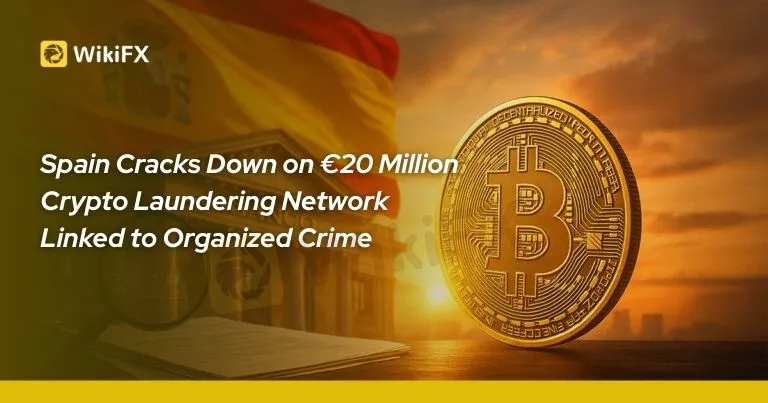简体中文
繁體中文
English
Pусский
日本語
ภาษาไทย
Tiếng Việt
Bahasa Indonesia
Español
हिन्दी
Filippiiniläinen
Français
Deutsch
Português
Türkçe
한국어
العربية
Spain Cracks Down on €20 Million Crypto Laundering Network Linked to Organized Crime
Abstract:Spanish authorities have uncovered a major crypto-based laundering scheme that funneled over €20 million for international crime groups. Through a dual-network structure, the operation combined traditional smuggling tactics with decentralized digital finance, revealing the growing threat posed by crypto to financial integrity.

Spanish authorities have dismantled a sophisticated money laundering network that allegedly moved over €20 million using cryptocurrency on behalf of organized crime groups. Described as one of the most advanced underground financial systems in Europe, the operation highlights the growing role of crypto in transnational illicit finance.
The investigation, coordinated by Spains National Police with the support of Europol and Eurojust, uncovered a dual-structured network with operations across six provinces and connections extending into Belgium. Seventeen individuals have been arrested, with fifteen currently in pre-trial detention. Charges include money laundering and membership in a criminal organization.
According to law enforcement officials, the network operated through two tightly coordinated cells. One, composed primarily of Arab nationals, managed incoming international transfers. The other, largely made up of Chinese nationals based in Almería and Madrid, collected large volumes of cash within Spain. These funds were then converted into cryptocurrency and transferred across borders, effectively bypassing traditional banking channels.
To conceal its activities, the group posed as a legitimate remittance service, promoting itself on social media and through closed networks. Cash was transported in vehicles with hidden compartments, a method commonly associated with drug trafficking. Authorities said this tactic allowed the network to move large sums discreetly while avoiding detection.
The assets seized during the operation reflect the scale and profitability of the scheme: over €205,000 in cash, €183,000 in digital assets, 18 luxury vehicles, 10 properties valued at more than €2.5 million, designer handbags worth €230,000, and premium cigars valued at €620,000. Officials believe most of these assets were acquired using proceeds from illegal activities.
This case underscores the increasing use of cryptocurrency as a laundering tool for real-world crimes. While crypto was once mostly associated with online fraud and darknet markets, it is now being actively adopted by traditional organized crime groups seeking anonymity and global reach.
Authorities emphasized that the investigation remains open. Forensic teams are currently analyzing seized digital devices and blockchain records in an effort to identify additional collaborators and clients who used the illicit service.
Disclaimer:
The views in this article only represent the author's personal views, and do not constitute investment advice on this platform. This platform does not guarantee the accuracy, completeness and timeliness of the information in the article, and will not be liable for any loss caused by the use of or reliance on the information in the article.
WikiFX Broker
Latest News
WikiFX “Elite’s View on the Challenge: Dialogue with Global Investment Leaders” Concludes Successful
Plus500 Review 2025: Trusted CFD Broker with Top Features Unveiled
Plus500 Q1 2025: Strong Growth Amid Trade War, Mehta Acquisition
Judge Reviews Sanctions Against CFTC in My Forex Funds Fraud Case
BaFin Issues Series of Warnings Against Unlicensed Financial Websites Exploiting German Consumers
How UK-China Financial Cooperation Is Shaping Global Resilience
Deriv Review 2025: A Growing Force in Online Trading
WikiFX Broker Assessment Series | WCG Markets: Is It Trustworthy?
Hantec Markets Launches 24/7 Crypto CFD Trading
FundedNext Expands into Brokerage with FNmarkets Launch and Strategic Leadership Hire
Currency Calculator


